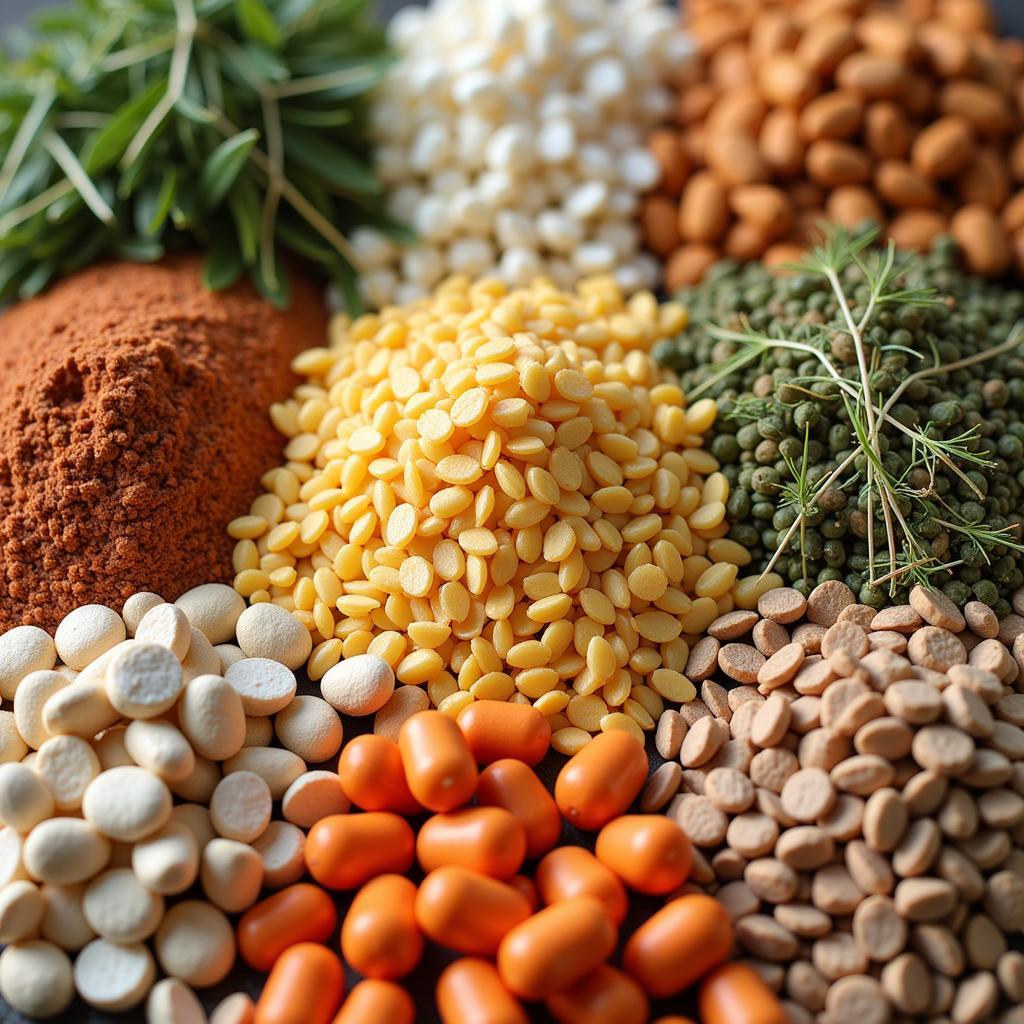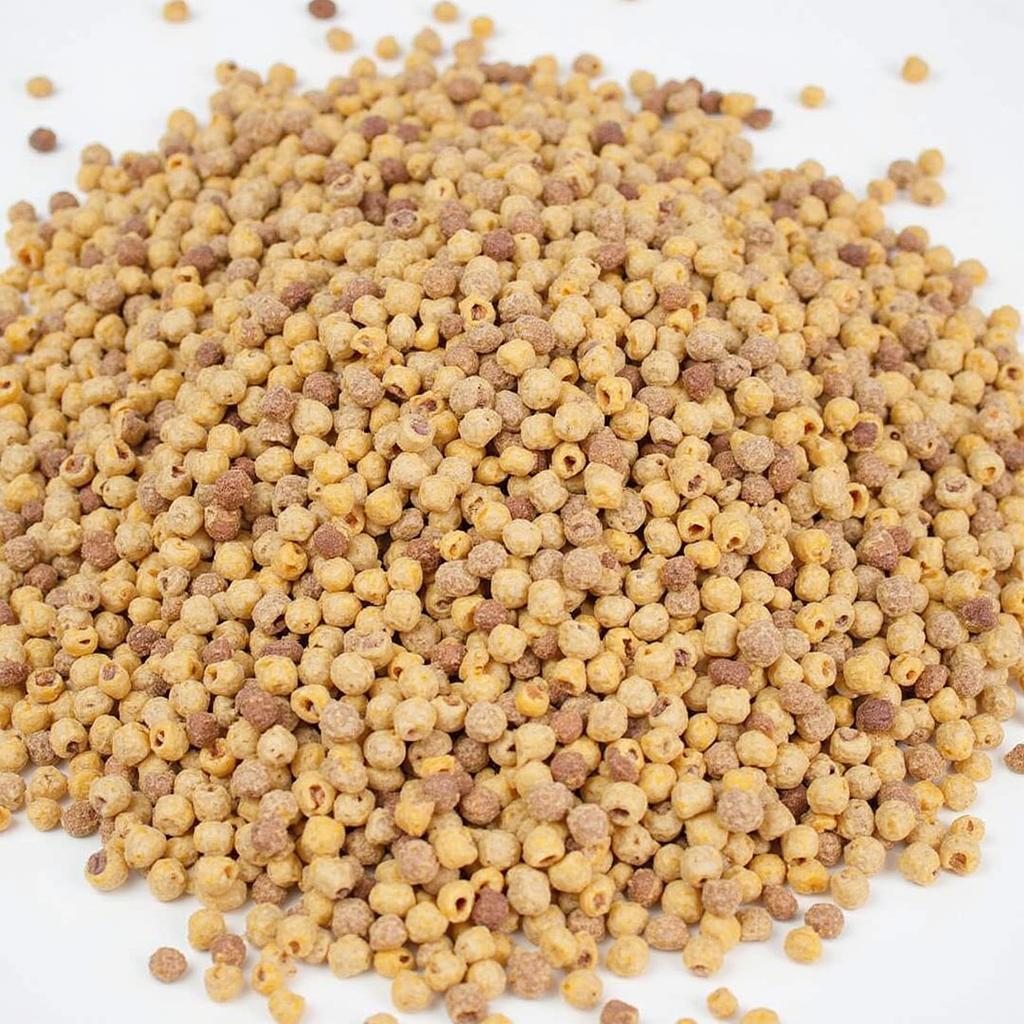Horse Pellet is a popular feed choice for horse owners, offering a convenient and nutritionally balanced diet. But understanding the nuances of horse pellets – from their composition to their benefits and potential drawbacks – is crucial for ensuring your equine companion receives optimal nutrition. This guide delves into everything you need to know about horse pellets.
Decoding the Horse Pellet: Ingredients and Benefits
Horse pellets are essentially a concentrated form of forage, grains, vitamins, and minerals, processed and compressed into small, easy-to-handle pellets. This makes them a practical alternative to traditional hay, especially for horses with dental issues, allergies, or those requiring a highly controlled diet.  Horse Pellet Ingredients Close-up
Horse Pellet Ingredients Close-up
One of the key advantages of horse pellets is their consistent nutritional value. Unlike hay, which can vary significantly in quality depending on growing conditions and harvesting methods, horse pellets are formulated to provide a standardized nutrient profile. This allows horse owners to precisely manage their horse’s dietary intake, ensuring they receive the correct balance of protein, fiber, vitamins, and minerals for optimal health and performance. For horses with specific dietary needs, such as those prone to laminitis or requiring extra calories for work, specialized pellet formulations are available.
Another benefit of horse pellets is their reduced storage space requirements. They are considerably more compact than hay, simplifying storage and reducing waste. This is particularly advantageous in areas with limited storage capacity or where hay is prone to spoilage due to humidity.
Different Types of Horse Pellets: Choosing the Right One
Not all horse pellets are created equal. Various types are available, each designed to meet the specific needs of different horses. Understanding these variations is essential for selecting the right pellet for your horse. horse pellet feeder
Alfalfa Pellets: A Protein-Rich Option
alfalfa pellets for horses are a popular choice for growing horses, lactating mares, and performance horses requiring higher protein levels. These pellets are made from dehydrated alfalfa, a legume known for its rich protein and calcium content. They are highly palatable and provide a readily digestible source of energy.
Grass Pellets: A Fiber-Focused Choice
Grass pellets are typically lower in protein and calories than alfalfa pellets, making them a suitable option for easy keepers, senior horses, or those with metabolic issues. These pellets are made from various grasses, such as timothy, orchardgrass, or Bermuda grass, and are a good source of fiber, which is crucial for maintaining digestive health.
Are Horse Pellets Right For Your Horse?
While horse pellets offer numerous advantages, they are not a one-size-fits-all solution. Certain considerations should be taken into account when deciding whether to incorporate them into your horse’s diet.
Horses are natural grazers, and their digestive systems are designed for continuous foraging. Pellets, being a concentrated feed, can be consumed quickly, potentially leading to digestive upset or boredom. It’s important to ensure that horses fed pellets still have access to forage, such as hay or pasture, to promote healthy gut function and prevent behavioral issues.
“Always ensure adequate water availability when feeding pellets,” advises Dr. Emily Carter, Equine Nutritionist. “Pellets absorb water, expanding in the horse’s stomach, so sufficient hydration is crucial for proper digestion.”
Managing Horse Pellet Feeding: Tips and Best Practices
Properly managing horse pellet feeding is vital for maximizing their benefits and minimizing potential risks. Here are some essential tips for successfully incorporating pellets into your horse’s diet:
- Introduce pellets gradually to avoid digestive upset.
- Divide the daily ration into multiple small meals to mimic natural grazing patterns.
- Always provide fresh, clean water.
- Monitor your horse’s weight and adjust the pellet quantity as needed.
- Store pellets in a cool, dry place to prevent spoilage.
cbd horse pellets are gaining popularity for their potential calming and pain-relieving effects, while horse wormer pellets offer a convenient way to administer deworming medication.
“Understanding your horse’s individual needs is paramount when selecting and feeding pellets,” says Dr. Sarah Miller, Veterinarian specializing in Equine Health. “Consulting with an equine nutritionist or veterinarian can help you create a balanced feeding plan that meets your horse’s specific requirements.”  Variety of Horse Pellets
Variety of Horse Pellets
Conclusion
Horse pellets offer a convenient and nutritionally balanced feeding option for horses. By understanding the different types of pellets available, their benefits, and potential drawbacks, you can make informed decisions about incorporating them into your horse’s diet. Remember, providing your horse with optimal nutrition is crucial for their overall health and well-being. Always consult with a veterinarian or equine nutritionist to develop a feeding plan that meets your horse’s individual needs and supports their long-term health. horse pellets for bedding are becoming a more sustainable choice.
FAQ
- Can I feed horse pellets as the sole feed source?
- Are horse pellets suitable for all ages and breeds of horses?
- How do I determine the correct amount of pellets to feed my horse?
- What are the signs of pellet-related digestive upset?
- How should I store horse pellets to maintain their quality?
- What is the difference between alfalfa and grass pellets?
- Can I mix different types of horse pellets?
Common Scenarios
- Scenario 1: Your horse has dental issues and struggles to chew hay effectively.
- Scenario 2: You need a convenient and consistent feed option for travel.
- Scenario 3: You want to precisely control your horse’s dietary intake for optimal performance.
Further Reading
You might also be interested in learning more about alfalfa pellets for horses.
Contact us for any assistance: Phone: 0772127271, Email: [email protected] or visit us at QGM2+WX2, Vị Trung, Vị Thuỷ, Hậu Giang, Việt Nam. We have a 24/7 customer service team.